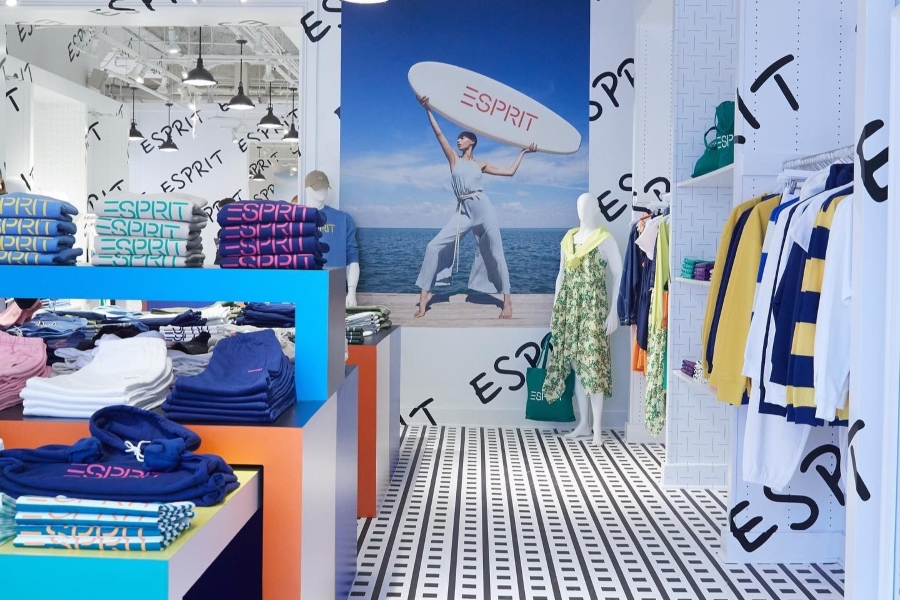Esprit puts trademark up for sale after slipping out of style

The clothing company was at the cutting edge of fashion in the 1980s but has struggled with competition from newer brands and is left with a shrunken market cap
Key Takeaways:
- Esprit announced it is in talks with a third party about selling its trademark and domain names in Greater China for $47.5 million
- The deal is unlikely to offer a major boost for Esprit or result in a special dividend
By Fai Pui
This is a story about a trendsetting business that fell out of fashion.
Esprit Holdings Ltd. (Esprit, 0330.HK) was a fashion powerhouse in the 1980s, enlisting one of the leading actresses of the era as a brand ambassador for its colorful and casual outfits. The blue-chip retailer was also popular with investors, reaching a market value of HK$171.5 billion ($22 billion) at its peak. But in finance, as in fashion, trends can be short-lived.
These days, Esprit is losing out to fast-fashion rivals as a style choice for China’s young consumers. With sales sagging, the company announced in late June that it is in advanced talks with an independent third party about selling its trademarks, related interests and major domain names in the Greater China region for $47.5 million.
The company said it was barely generating any revenue in the region and its business there was in the red. The talks have not reached a binding or final agreement yet. But Esprit said it expected to get an upfront payment of $10 million once a definitive deal is signed and would use the rest of the money to fund general operations.
The news sent the stock surging more than 34% at one point, but the price fell back to its pre-announcement level two days later, indicating a lack of enduring enthusiasm from investors. Even if the deal is sealed, a price that equates to HK$370 million pales in comparison to the company’s loss of HK$2.34 billion last year, said Curtis Yeung, strategist at UOB Kay Hian (Hong Kong). The proceeds would not make a major difference and were unlikely to trigger any special dividends, he said.
Esprit was set up by the San Francisco couple behind the North Face outdoor clothing and equipment business, Douglas Tompkins and Susie Russell. Esprit targeted a youthful market with an ethos of vitality, freedom and cool chic. The clothing line was introduced into Hong Kong in 1981 when buying agent Michael Ying set up the first Esprit store in the commercial district of Causeway Bay. Tompkins started selling his shares in 1990 after the breakdown of his marriage to the company co-founder. At that point Ying jumped in, taking control of Esprit’s Asia-Pacific operations and then the entire business, which went public in Hong Kong in 2002.
Ying could bank on the star power of his actress wife, Brigitte Lin, who wore Esprit outfits at all her public appearances. With her celebrity backing, Esprit caught on in both mainland China and Hong Kong, establishing itself as a leader in the fashion industry. The business grew rapidly for several years, achieving a share price of HK$123.5 and a market valuation of HK$171.5 billion in 2007.
As the stock scaled new heights, Ying began to step back from the boardroom and sell down his stake. He resigned as chairman and CEO and by 2010 had severed ties, walking away with around HK$21.9 billion.
It turned out to be a timely move, as Esprit’s business started to break apart at the seams in the aftermath of the 2008 financial crisis. The stock slipped into a decline lasting more than a decade and lost its blue-chip status in 2013. Up-and-coming retailers such as H&M, Uniqlo and Zara ate into its youth market, shrinking Esprit’s market cap to less than HK$400 million.
Outmoded business model
Asked about their impressions of Esprit, Chinese netizens are likely to say the brand is not cool or stylish, and nor is it particularly cheap when compared to other fashion options.
Analyst Yeung believes Esprit has failed to position its brand effectively in a market that has come to expect rapid turnover of styles. Esprit has its clothing designed in-house, made by contractors and sold through third-party retailers, in a relatively long product cycle, he said. “It is not updating the designs fast enough. And the pricing is neither high nor low. The model is out of date compared with the likes of Uniqlo and H&M.”
Esprit closed all its stores across Asia back in 2020. A planned comeback through a joint venture with Mulsanne Group, a clothing platform operator, was derailed by the Covid pandemic. The declining influence of Hong Kong culture on the Chinese mainland added to the company’s woes, a fate it shares with many Hong Kong brands.
The Chinese market has proved to be tough territory for Hong Kong companies involved in the core retail categories of clothing, food, housing and transport. For example, Cafe De Coral (0341.HK) made a big push into the Chinese mainland in 2003, only to retreat after struggling to suit local tastes. Hong Kong used to be a leading Asian hub for pop culture, but it has gradually ceded its standing to South Korea and the mainland entertainment industry. The rise of social media and e-commerce created fresh challenges and compounded Esprit’s problems in adjusting to a changing market.
Esprit has been struggling to stay afloat in Europe as well, with repeated attempts at restructuring. Groaning under a heavy debt burden, its Swiss subsidiary began bankruptcy proceedings late last month, after insolvency filings by its businesses in Belgium and Germany.
Esprit has made many attempts at a reboot. In 2012 it hired an executive from Inditex Group, the parent company of Zara, to carry out a makeover. Manuel Martinez Gutierrez was enticed by a jaw-dropping annual salary of HK$40.35 million, but he was not able to emulate Zara’s success. In 2018 Esprit turned to Anders Christian Kristiansen, the CEO of fashion chain New Look, to head another business overhaul, which yielded some promising results. But the relaunch came unstuck during the Covid pandemic.
Fashion consumption is now being driven by Generation Z and millennial buyers, who were born after Esprit’s heyday. Brands that can cater to changing tastes at an appealing price have the strongest chance of staying on top in the style stakes, while less nimble companies such as Esprit have their work cut out.
To subscribe to Bamboo Works free weekly newsletter, click here





